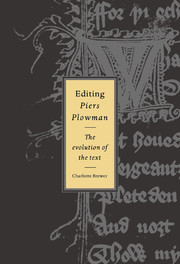Book contents
- Frontmatter
- Contents
- Acknowledgements
- Abbreviations
- Note on the texts
- Introduction
- Part I The early phase
- Part II The late nineteenth century
- Part III The Skeat aftermath
- Part IV Chambers and Grattan, Knott and Fowler
- 12 Chambers 1909–1910
- 13 Chambers versus Knott
- 14 Chambers' graduate students
- 15 Chambers 1931
- 16 Chambers 1935–1942
- 17 The Chambers and Grattan collations
- 18 Grattan and Kane
- 19 Knott and Fowler, Donaldson, Mitchell, and Russell
- Part V The Athlone Press edition
- Part VI Epilogue: the Athlone aftermath: Schmidt, Pearsall, Rigg-Brewer, et al.
- Works cited
- General index
- Index of manuscripts
- CAMBRIDGE STUDIES IN MEDIEVAL LITERATURE
15 - Chambers 1931
Published online by Cambridge University Press: 20 August 2009
- Frontmatter
- Contents
- Acknowledgements
- Abbreviations
- Note on the texts
- Introduction
- Part I The early phase
- Part II The late nineteenth century
- Part III The Skeat aftermath
- Part IV Chambers and Grattan, Knott and Fowler
- 12 Chambers 1909–1910
- 13 Chambers versus Knott
- 14 Chambers' graduate students
- 15 Chambers 1931
- 16 Chambers 1935–1942
- 17 The Chambers and Grattan collations
- 18 Grattan and Kane
- 19 Knott and Fowler, Donaldson, Mitchell, and Russell
- Part V The Athlone Press edition
- Part VI Epilogue: the Athlone aftermath: Schmidt, Pearsall, Rigg-Brewer, et al.
- Works cited
- General index
- Index of manuscripts
- CAMBRIDGE STUDIES IN MEDIEVAL LITERATURE
Summary
There is no doubt that Chambers' editorial work on Piers Plowman was beginning to lose its impetus by the mid-1920s. He had published an article on ‘Long Will, Dante, and the Righteous Heathen’ in 1924, but this did not deal with textual matters. His colleague A. H. Smith later described how ‘a growing distaste for work of an analytical character turned Chambers to other fields and the work [on Piers Plowman] lagged, especially after Grattan's departure to Liverpool, except for fitful pricks of conscience’. E. G. Stanley remembers that C. J. Sisson (one of the other English professors at University College, London) used to tell how he would lock up Chambers and Grattan (on his visits to London) in a room together in order to get them to work on their edition of the poem. Later, Chambers complained that his work on the text had been needlessly delayed by the printed opinions of Mabel Day, who published articles in 1922 and 1928 arguing on the basis of evidence in Skeat's editions that as many as five authors (not counting But) had written the poem. The fact that Day ‘had never consulted a MS.’ made him particularly angry.
In 1930 Chambers wrote to Grattan, ‘we must do our duty to old William Langland (and to Skeat) before the night comes when no man can work’, his melodramatic turn of phrase revealing his sense of responsibility to a text of such national importance; the result was the publication in 1931 of an article entitled ‘The Text of Piers Plowman’. The work is signed by both Chambers and Grattan, but Chambers as always played the leading role.
- Type
- Chapter
- Information
- Editing Piers PlowmanThe Evolution of the Text, pp. 272 - 283Publisher: Cambridge University PressPrint publication year: 1996

